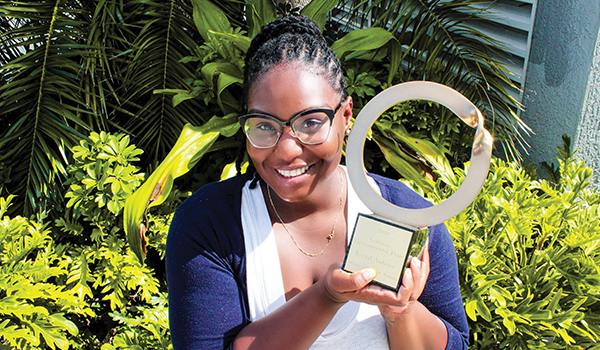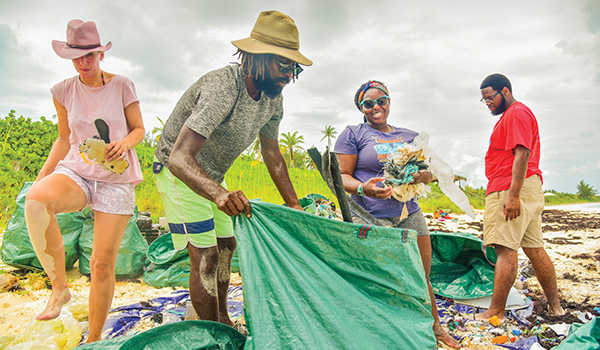Environmental scientist Kristal Ambrose ’16 said she doesn’t see herself as a hero, but rather “a young woman who saw a problem and did something about it.”

2020 Goldman Environmental Prize winner for Islands & Island Nations, Kristal Ambrose ’16 (Credit: Goldman Environmental Prize)
The problem? Harmful single-use plastics that last forever, affect human health, spoil our groundwater, attract other pollutants, threaten wildlife and the environment, poison our food chain, and cost billions to abate.
What is she doing about it? Leading a movement to teach the world to break plastic dependency and an entire country in banning single-use plastics. That feels heroic.
Ambrose said she’s always been curious about what was beneath the ocean’s surface and has wanted to pursue marine biology from a young age. After graduating high school, she worked in a local dive shop and then an aquarium before becoming a research assistant for several marine research institutes in The Bahamas.
In 2012, Ambrose sailed the Pacific Ocean to study the Western Garbage Patch, a known gyre containing marine debris. When she saw the impact of the world’s – and her own – plastic-filled lifestyle, her focus shifted to the pursuit of plastic-free seas.
She returned home, ready to spark a plastic pollution revolution: The Bahamas Plastic Movement.
BPM’s mission is “to build a community of education and activism around plastic pollution. By empowering Bahamians to contribute to hands-on citizen science and environmental leadership, BPM aims to evolve mindsets and spark cultural practices that will be pivotal in executing changes at the policy level.”
Every 10 seconds 240,000 plastic bags are used worldwide, contributing to 280 million tons of plastic produced annually. More than five trillion pieces of plastic weighing 268,940 tons pollute the world’s oceans. One hundred thousand marine animals are affected annually through ingestion or entanglement of plastic debris due to our plastic dependence.
Enter the work of Ambrose’s Bahamas Plastic Movement, which includes educating students in K-12 classrooms in The Bahamas and the United States, engaging them in citizen science research, and developing curriculum. BPM sets up projects on plastic pollution and recycling, helps students gain service credits through volunteering, and so much more.
“Working with youth keeps me hopeful,” said Ambrose, 29. Through her advocacy, she also works annually with the Algalita Plastic Ocean Pollution Solutions Youth Summit. “They remind me that this work is deeper than plastic and more about giving a voice to the voiceless and using that voice to protect our earth and oceans that we love and rely on.”
Why is it so important to involve and educate young people?
“Their voices deserve to be heard,” Ambrose said. “Young people are full of incredible ideas. They are passionate, courageous and globally connected. When we engage young people in environmental and social issues, it awakens them to their capabilities and creates an allyship that can propel any movement forward.”
Ambrose’s earth-changing work doesn’t stop with founding a nonprofit that changed the way a nation – and through outreach like their social media and film “Plastic Warriors,” the world – views and uses plastic.
Kristal Ambrose, also known as Kristal Oceans, went on to earn the Environmental Youth Leader Award from The Government of The Bahamas in 2014. In 2016, Ambrose earned her bachelor’s degree in interdisciplinary science from Gannon with a focus on environmental science, biology and education.
“My history electives (at Gannon) with Dr. Baugh and Dr. Bloodworth were life-changing. Those courses somehow reshaped my worldview and made me aware of my position in the world and the power I have as an individual to use my voice to drive change,” Ambrose said.
Leaving Gannon, Ambrose established a marine debris management plan for The Bahamas at Dalhousie University and became the 2017 recipient of the Queen Elizabeth II Diamond Jubilee Scholarship Program there.
Ambrose drafted a bill to show what a single-use plastic ban could mean for The Bahamas as she discovered how plastics move through the marine environment. In early 2018, she and her students secured a meeting with the environmental minister, and by April of that year, he announced a ban on single-use plastics like plastic bags, cutlery, straws and styrofoam, effective July 2020.

Kristal Ambrose ’16 at a beach cleanup in the Bahamas. (Photo: Dorlan Curtis, Jr. and Jawanza Small, credit: Goldman Environmental Prize)
In 2020 Ambrose was awarded the Goldman Environmental Prize – the world's foremost award honoring grassroots environmental activists – for her work with the BPM. She has been featured in the Sierra Club Magazine and Coastal Living Magazine, where she was named an “Ocean Hero.”
“Being honored at this level is extremely humbling,” Ambrose said. “It’s a reminder to keep going and validation that the work that I’m doing is important, but not by any means a sign to slow down and get comfortable. I’m extremely grateful for the recognition at all levels.”
Grateful, passionate and far from done.
Ambrose is studying for her doctoral degree at the World Maritime University in Sweden, focusing on marine debris monitoring strategies for the Caribbean region.
“Life is school,” she said. “Continuing with my education as a double minority in the marine sciences, being a black woman, having a Ph.D. will allow me to shatter the glass ceiling and hopefully move beyond the discriminatory barriers that hold professionals back, because despite being capable, we are deemed less than because we don’t have letters behind our names.”
“Lastly, my academic and life’s journey serves as a goal post for youth from The Bahamas to pursue their dreams at all cost, knowing that it doesn’t matter where you come from or what you have. It’s about honoring the possibilities and knowing that you can make your wildest dreams come true,” Ambrose said.
“It doesn’t matter where you come from or what you have, it’s about honoring the possibilities and knowing that you can make your wildest dreams come true.” - Kristal Ambrose '16
So, is there anything the rest of can do to make a difference for the environment? Absolutely.
“Assess your footprint first,” she said. “What single-use items are you using a lot, and begin there. Refusing plastic bags and water bottles and swapping them for reusables are great places to start. And it doesn’t need to be anything fancy or super expensive. Meet yourself where you are and use what you have.”
“Take a metal utensil from home and keep it in your bag to avoid (single-use plastic) ones. Keep your glass pasta jar and turn it into a cup or food storage container. Say no plastic straw please when you dine out and take a reusable one with you,” Ambrose said.
“The possibilities are endless. You just have to start.”
To learn more about The Bahamas Plastic Movement, visit www.bahamasplasticmovement.org.